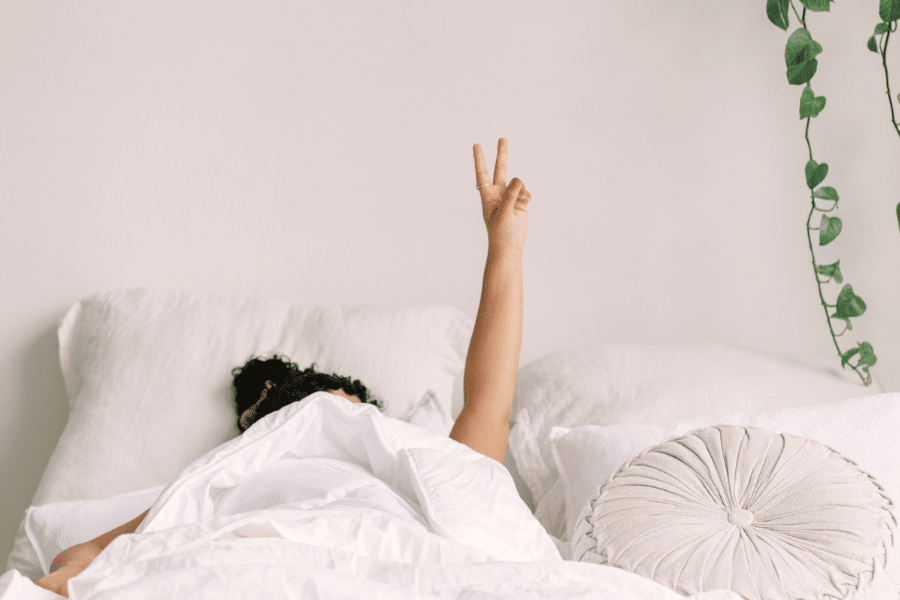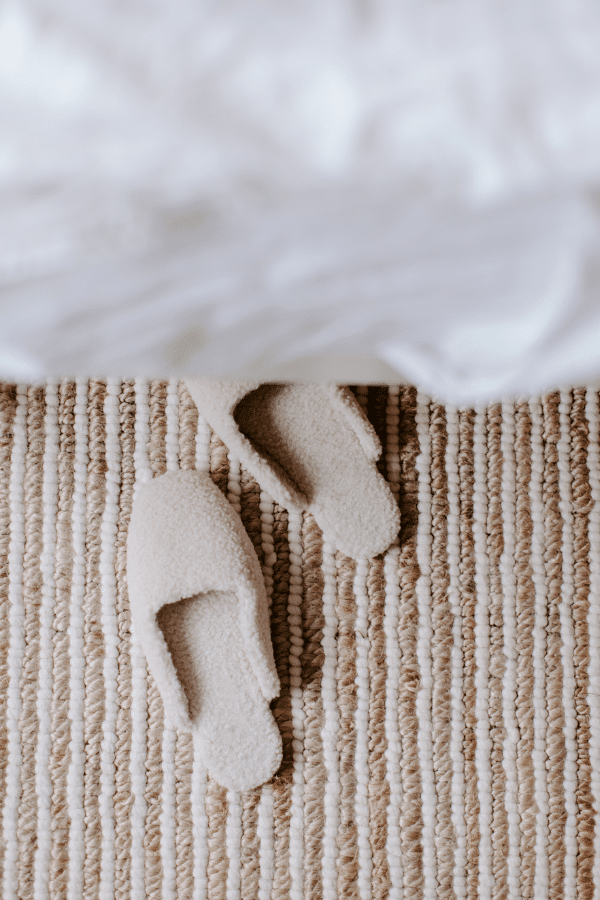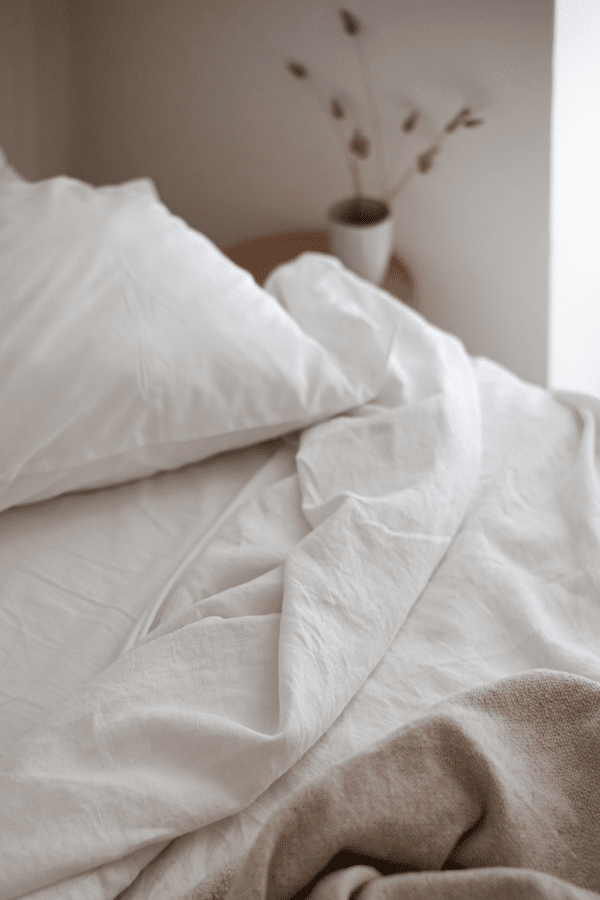How to Wake Up Early: 9 Tips to Get Up in the Morning
Want to wake up early but struggle to get out of bed and always hit the snooze button? This guide has the best tips and tricks on how to be an early riser.

I used to ALWAYS sleep in until the last minute and had trouble getting up before noon on the weekends. My sleep cycle was irregular and I never felt like I got enough sleep. I always thought morning people were superhuman and that I would forever be a night owl. Finally, during my junior year of college, I decided to make a change and start waking up early. I saw all the benefits of waking up early and loved it. Today, I wake up between 5-6 am energized and ready to start my day!
However, the transition to being a morning person wasn’t easy, especially when social media, Netflix binges, and late-night munchies play the villains. Don’t worry! I’ve included everything you need to know to make your journey from being a night owl to an early riser as smooth as possible.
This post is all about the best tips for how to wake up early.
BENEFITS OF WAKING UP EARLY
I truly think waking up early is the secret sauce for a productive day. The calm of the early morning provides an excellent environment for deep work, and studies have linked early rising to better mental health. Plus, who can resist the beauty of a quiet morning brimming with fresh energy levels and opportunity? Here are some of the best benefits of waking up early:
#1. Increased productivity and performance
Early birds often have a head start on the day, allowing them to tackle important tasks without distractions. You’ll have a few extra hours to invest in your work, a personal project, or even a hobby before the rest of the world wakes up. In addition, the discipline, productivity, and positivity linked with waking up early often translate into improved work performance.
#2. Improved mental health and reduced stress
Research has linked early rising to better mental health. Waking up with the sunrise can enhance your mood, promote optimism, and help you start your day on a positive note. Early risers also have more time to start their day calmly and are better equipped to manage daily tasks without undue stress.
#3. Enhanced Fitness Goals
If you’re a fitness enthusiast or looking to start a new exercise routine, the early morning can be the perfect time. Morning workouts kickstart your metabolism and energy levels, preparing you for the rest of the day.
#4. Quality ‘Me’ Time
Waking up before others can provide a rare slice of quiet in our otherwise busy lives. The undisturbed early morning is a great time for self-reflection and personal growth activities. You can use it for meditation, mindfulness, setting goals, or simply sipping your tea in peace.
Post You Might Like: 5 Powerful Daily Habits to Improve Your Life
FACTORS AFFECTING YOUR ABILITY TO WAKE UP EARLY
Before I jump into how to wake up early, let’s talk about a few important factors that might be affecting your status as an early riser today.
Your circadian rhythm
Not everyone’s clock is the same. Some of us are more inclined to stay up late and wake up late while others are early birds chirping away at the crack of dawn. It’s important to understand your natural sleep and wake times are often determined by genetics and environmental factors like light exposure.
The good news? With some effort, we can tweak them to become early risers!
Melatonin
Melatonin is a hormone produced by our bodies that regulates our sleep-wake cycle. It’s often called the “sleep hormone,” as high levels can help you fall asleep. In some cases, taking a melatonin supplement before bed can help cue the body for sleep, but it’s always best to consult a healthcare provider before starting any supplement regimen.
Dietary factors
The food and drinks you consume can significantly impact your sleep quality. Try to avoid heavy meals close to bedtime to prevent acid reflux and sleep disruptions. Monitor your caffeine intake – that late-afternoon latte can be the reason you’re tossing and turning at night. And while alcohol may make you feel sleepy, it actually disrupts the quality of your sleep.
Physical Activity
Time your exercise appropriately. Early morning workouts can help you feel awake and energetic, but evening workouts should be finished a few hours before bed to avoid sleep disruptions.
BEST TIPS ON HOW TO WAKE UP EARLY
Ready to transform into an early riser? Here’s your action plan!
#1. Find your “why”
Identify why you want to wake up early. Do you want extra time in the morning to do your skincare routine? Maybe you want to start your days with quiet time before jumping into a busy work schedule. Whatever it is, understand your motivation for having a few extra hours in the morning. By identifying your “why,” you’ll have something to pull you out of bed each morning.
#2. Figure out what you’re going to do when you wake up.
After finding your why, take some time to decide on the actions you’ll take right when you wake up. This could be drinking a glass of water, brushing your teeth… whatever you can consistently do without thinking! By identifying the actions you’ll take upon waking, you create less resistance to getting out of bed. The fewer decisions you have to make, the easier it will be to develop a habit of doing them.
Choose something you’ll look forward to each morning. The first thing I do, when I wake up, is make coffee and savor it on the couch while I journal. I absolutely love and crave this practice now – it puts me in a better mood for the rest of the day!
Post You Might Like: How to Create a Productive Morning Routine
#3. Prepare for success the day prior.
Your success with waking up early starts the day before. Evaluate any factors that may be impacting your sleep habits. For example, you might chug energy drinks around 2 pm and it keeps you up until the middle of the night. Or, you always eat a carb-heavy lunch that makes you take an afternoon nap. To improve your chances of getting up the next morning, you need to get better sleep and avoid behaviors that impact your sleep patterns poorly.
In addition, prepare everything you’ll need the next morning. If you’re planning to hit the gym early, choose your workout clothes so you can just change into them and go. To help your brain wake up to some light, crack the blinds open a little or get a sunrise alarm clock. Take the evening to make sure you have everything you need for the next day!
#4. Create a sleep-conducive environment
Having a sleep-friendly environment can drastically improve your sleep quality. This includes keeping the room dark, maintaining a cool room temperature (around 65°F or 18°C), and reducing noise. If needed, consider using earplugs, an eye mask, or a white noise machine.
#5. Have a relaxing bedtime routine.
To signal to your body that it’s time to sleep, introduce a relaxing bedtime routine. Opt for calming activities like reading a book, journaling, yoga, meditating, or sipping a warm cup of tea. Limit your exposure to artificial light (ie. screen time) at least 30 minutes before bed to help you calm down.
Avoid stimulating activities like watching TV and limit your exposure to artificial light (ie. screen time). The blue light emitted by electronic devices can interfere with melatonin production, the sleep hormone, making it harder to fall asleep. So say goodnight to your phone an hour before bed.
#6. Decide how you’d like to approach waking up early.
Depending on your preferences, choose if you’d like to work gradually towards your wake-up time or if you’d like to just take the plunge. If you want to inch towards your wake time, start by setting your alarm 15 to 30 minutes earlier than usual and work your way up.
If you want to go all in, try to cut out all sleep disturbances the day before (ie. caffeine) and sleep early. Set your alarm for your goal time and force yourself up. Even if you can’t commit to completing a full morning routine the first few days of early rising, just make sure you’re up and out of bed. Beware that drastic changes to your sleep schedule can cause excessive daytime sleepiness as your internal body clock needs time to adjust!
Surprisingly, the all-in approach worked best for me. I set my alarm for 5 am and for the first few days, I would just sit on the couch and drink my coffee while browsing my phone. As soon as I felt more adjusted to the new schedule, I started introducing better habits I wanted to do in the morning.
#7. Aim for consistency.
Go to bed and wake up at the same time every day. Yes, even on weekends! Having a consistent bedtime routine will help reinforce your new sleep schedule. This will help you fall asleep and wake up more easily.
#8. Get natural light in the morning.
Get plenty of natural light in the morning. Light exposure is a powerful cue for our body’s circadian rhythms. Make sure you open your curtains or go on a brisk walk to soak up some vitamin D!
#9. Seek professional help if needed.
If you’re struggling to wake up early despite trying all these tips, it might be a good idea to consult a sleep specialist. They can help identify any underlying issues like sleep apnea or insomnia and provide personalized solutions.
Remember, waking up early and establishing a healthy morning routine is a process. It requires patience, commitment, and small, consistent changes to your lifestyle. But the reward? Becoming an early bird who gets to enjoy serene, productive mornings and has a head start on the day.
This post was all about the best tips on how to wake up early.



